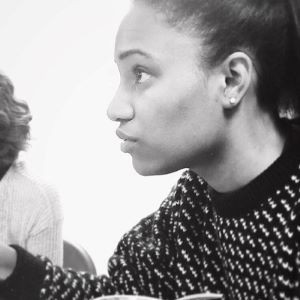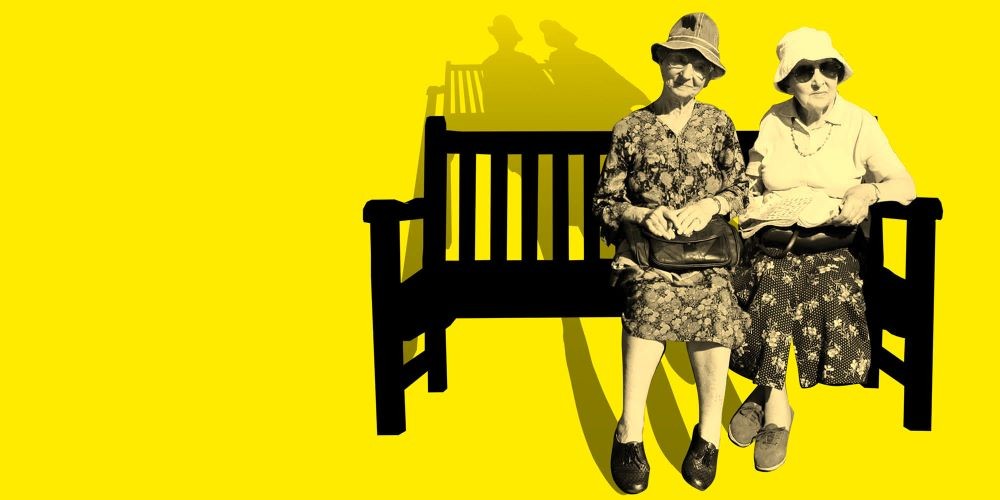Directing Thesis Interview: Terrorism
Written by The Presnyakov Brothers
Translated by Sasha Dugdale
Produced by arrangement with Nick Hern Books
Underproduced Terrorism Finds New Life as Velani Dibba’s Third-Year Director’s Thesis.
Current student Velani Dibba ‘20 (Directing) illuminates what she calls a “tonal beast” of a timely and moving script. Below is our interview with her.
Why did you decide to do this particular production for your thesis project?
I actually first encountered this script before I became seriously involved in theatre. It was assigned for a philosophy course alongside some Susan Sontag, Jean Baudrillard, and an Art Spiegelman comic. I didn’t fully understand it at the time, but I was fixated on the idea of a play that allowed us to see into the lives of its bystanders. I was fascinated with the way it dramatized the banal, and certain moments in the play have always stayed with me: the staff member who enters with the Evian bottle, the man sniffing socks, and the two older women on the park bench. It’s an oddly sensorial play, and I’ve been itching to do a design-focused production since creating an immersive adaptation of A Space Odyssey last year. The play is both irreverently funny and deeply tragic, features a large ensemble, and is kind of a beautiful exercise in allowing an audience just enough information to relate to its characters. It was and continues to be an exciting opportunity to work through some of my favorite theatrical challenges.
What do you hope the audience will get out of the performance?
I hope audiences walk away with the sense that life is more complicated than it seems on the surface. Reading this play always impresses upon me how interwoven our actions are with each others’ lives, and how easy it is to cause harm to one another. I hope that, despite watching these characters make decisions that have horrible consequences in each others’ lives, our audience gains a greater appreciation for what others might be going through.
What was the most exciting part about this project?
This is going to sound trite, but I’ve been super excited to work with this team. I worked with Dennis Ho, our Production Stage Manager, on the first ever piece I directed at Columbia three years ago, and both our Producer Maryl McNally and our Dramaturg Stephen Smith have worked with me on some of my favorite past projects. I quite literally could not have asked for a better team. Together, the three of them have helped calmly steer this production and pushed me towards more ambitious creative indulgences, and everyone who has joined since then has been equally as collaborative and bold in their work on the show. The entire process has been incredibly uplifting and full of discovery thanks to each of the artists on it.
What was the biggest challenge?
The play is a bit of a tonal beast, and its structure (six seemingly unrelated scenes with no through-characters) added an extra level of difficulty to everything, from scene transitions to casting. We’re fortunate to have an incredible cast that is able to hit all those different tones, and who has been rigorous in exploring all the play’s layers. Each of them are playing two to three very different roles, and it requires a great deal of flexibility to pull off. Casting, however, was a bit complicated since none of the characters have names (they’re listed as First Man, Second Man, etc. and at times different characters have the same name). We had to rename all the characters, pull the play apart, create a timeline, anticipate quick changes, and make strong decisions on how we wanted to double cast. Then we went into auditions and readjusted a second time based on those, all before even starting rehearsals.
What has been a crucial lesson from your training?
At Columbia we spend our first two years directing two performances a week, coordinating rehearsals on our own with outside actors and designing costumes, sound, and lights ourselves as well. The turnaround is so quick that you often don’t have time to sit with your material and let it marinate as much as you want, so you’re forced to direct by intuition. Over those two years you learn which of your instincts to follow, and how to listen harder during rehearsals for what might be the right direction. I used to consider every choice I made carefully, and if something was off I would go home and revise my concept. Now, I’m better able to adjust to what’s happening in the rehearsal room and pivot in motion. I credit Anne Bogart and Brian Kulick with teaching me to “think faster” and “see better,” respectively.
Tell us something that you found surprising about the process of putting up this production?
I’m continually surprised by how meta-theatrical the script is. Without giving too much away, it’s a play that is as much about the theatrical experience as it is about everyday life. I’ve been particularly interested in how plays make audiences physically feel, and not just think. This play asks its production to interrogate form as much as genre, which is both a delightful and daunting offering.
What is your philosophy for directing?
I believe that people are able to do their best work when they feel taken care of. It is the director’s job to set the tone of the process, to uplift the best ideas even if not their own, and to strive to understand all the production areas they interact with. It is important to me to collect a room of people who have individual stakes in a project, who feel as though the show is also theirs and not only mine. I firmly believe that a director’s worth is measured not just in the strength of their ideas, but in their ability to convince others of those ideas. This project has been a great opportunity for me to work on both.
Where do you see yourself in five years?
In five years I’ll be 29, so I hope that I’ll have been able to find comparable health insurance to my parents’ :) In addition, I hope to be creating work that challenges our understanding of the way the world works, forcing us to reconsider the way we interact with one another. I would love to get a few more skills under my belt (I’ve had a growing interest in film and circus - separately), work more intensively in design, and hopefully continue to work with artists who push me past my comfort zone.

Velani Dibba is a Polynesian-Gambian director and designer, raised in the United States, the Gambia, and Italy. She received a bachelor’s degree from Georgetown University’s School of Foreign Service before coming to New York to pursue her directing MFA at Columbia. This past summer, she served as Anne Bogart’s assistant director on Falling & Loving, a new SITI Company collaboration with Elizabeth Streb’s STREB Extreme Action. She currently works as the Producing & Dramaturgy Intern at SITI Company, and was a former fellow both at the Laboratory for Global Performance & Politics in Washington, D.C. and the Global Cultural Institute at the University of Edinburgh. Recent directing credits include Apologies to the Bengali Lady (Edinburgh Fringe Festival), Patience (Corkscrew Theater Festival), Space Odyssey (Columbia University).
Terrorism is a darkly comic rendering of the latent violence lurking beneath the mundanity of everyday life.
Thursday, March 05, 2020, 8:00PM
Saturday, March 07, 2020, 8:00PM
Tuesday, March 10, 2020, 8:00PM
Friday, March 13, 2020, 8:00PM
Saturday, March 14, 2020, 2:00PM
